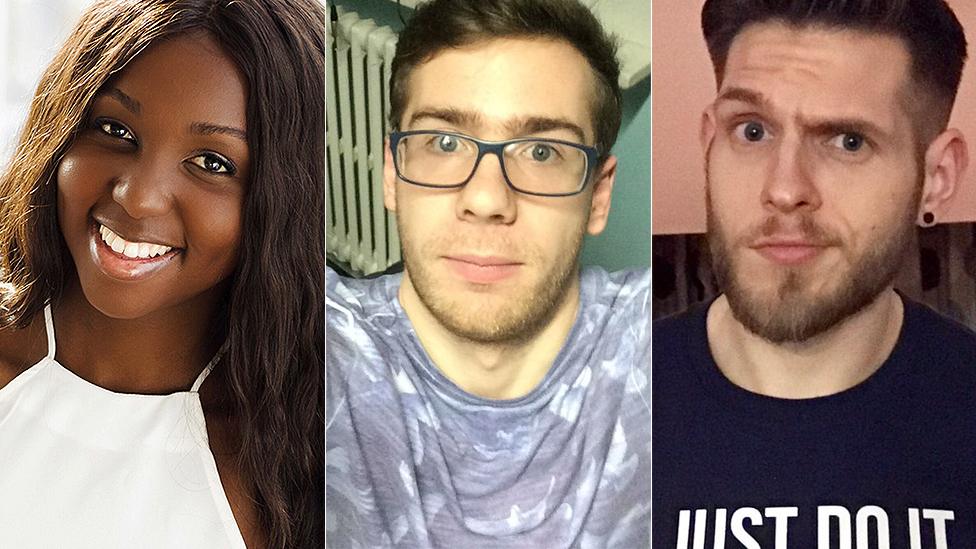Polyamorous marriage: Is there a future for three-way weddings?
- Published
Meet the three men who 'married' each other
A so-called "throuple" in Colombia have been hailed as having the first legal union between three men in the world. So will we see three-way marriages in the future?
"Victor tells the bad jokes," says Manuel.
"Very bad," agrees his partner Alejandro.
"I tell the smart ones," says Manuel.
Manuel José Bermúdez Andrade, Víctor Hugo Prada and Alejandro Rodríguez are all in a relationship together. They used to be four but their boyfriend Alex Esnéider Zabala died in 2014.
"The decision to marry was there before Alex died, the four of us wanted to get married," says Víctor.
"Alex's cancer changed our plans. But I never gave up."
When Alex died, the remaining three, who live in the Colombian city of Medellín, say they had to fight to be seen as his partners and get access to his pension.
It made them all the more determined to get legal recognition of their relationship.

Alex Esnéider Zabala was in the relationship for eight years before he died in 2014
They are now planning their long-awaited wedding ceremony after a supportive lawyer signed a special legal document last month.
"A document that tells us we are a family, and live together as three under the same roof, sharing a bed, a table, everything a family does," explains Víctor.
'Unimaginable'
The paperwork formalises their union, but it is not a full marriage certificate. Like in most countries - except those that accept polygamy - it is illegal to marry more than one person in Colombia.
But Alejandro, Manuel and Víctor's legal success is a big step forward in a world where group marriage has been firmly off the agenda.
Could cases like theirs signal the start of a concerted effort by campaigners to allow it?
"The movement is absolutely going to develop if the activists so choose," says Hadar Aviram, a professor of law at University of California in the US.

What is a polyamorous relationship?
A romantic relationship where those involved agree it is OK for everyone to be open to or have more than one romantic partner
Some groups allow their members to seek additional partners, while others do not
Distinctions are drawn with polygamy - or more specifically polygyny - in some Muslim societies and fundamentalist Mormon communities when one man may have multiple wives, based on a perception this is inherently disempowering for women
Source: More than Two , external
Read more

Prof Aviram said she found little appetite for marriage among polyamorous groups when she first started her research in 2004 but she began to see a change around 2012.
A study by the US-based organisation Loving More, external the same year found that 65.9% of more than 4,000 polyamorous people said would want to marry multiple people if such marriages were legal.
The same year there were reports of a three-way civil union in Brazil. In 2015 three men in Thailand, external apparently had a Buddhist wedding ceremony.
Prof Aviram believes changing attitudes may be due to wider acceptance of same-sex marriage around the world, making way for new taboos to be broken.
"Perhaps in the 1970s, same-sex marriage was as unimaginable as group marriage is today," she says.
'It just felt right'
Legal marriage may still seem a distant prospect but cases like that in Colombia are giving hope to others in three-way relationships.
"It's really encouraging," says DeAnna Rivas, a married mother of two from Florida.
The 28-year-old suggested to her husband, Manny, that they start experimenting with another woman in 2014.
"I grew up having crushes on both men and women," she says. "But by the time I got married to Manny I had been with him for five years and our relationship was based on me and him."
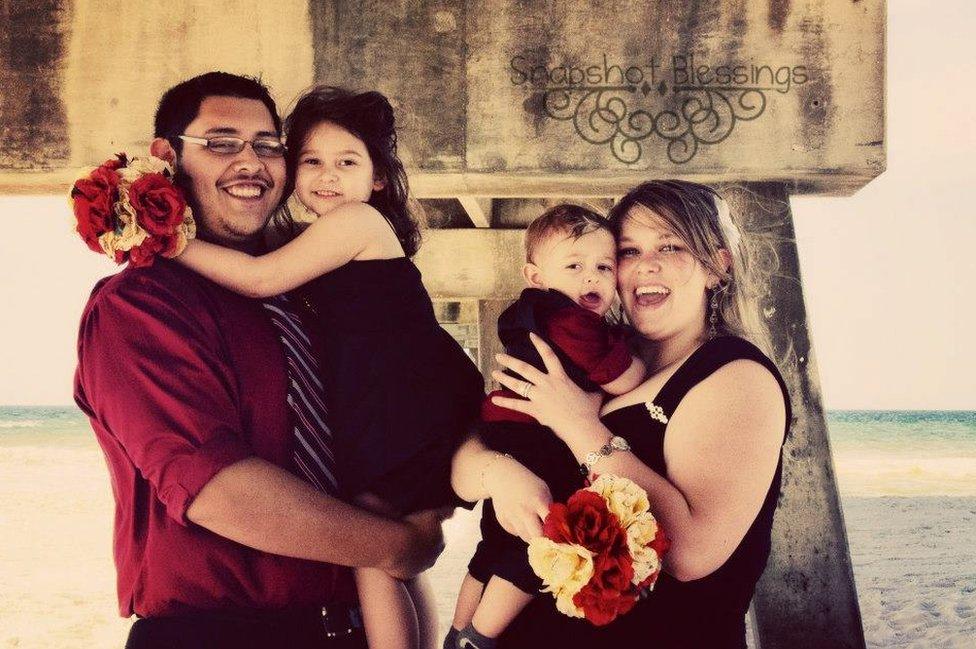
Manny and DeAnna, pictured with their children Vaneza and Gabriel, got married in 2013 after five years together
But after the birth of their second child, DeAnna was struggling with depression and felt she could not get enough emotional support from her husband alone.
"I was so unhappy I couldn't express my feelings to him. I had another part of me that was missing.
"When we met Melissa it just felt right."
DeAnna, an art teacher, now lives with both Manny and 20-year-old Melissa James; they share incomes, childcare and household duties, and a bed.
"It's the majority of men's fantasies to have two women," says Manny, a boat salesman.
"At the same time when we first started it was kind of daunting.
"I was a little fearful as far as bringing someone else into our relationship - I thought maybe she'd want to take my wife.
"But we gave it a shot and it worked out a lot better than I expected."
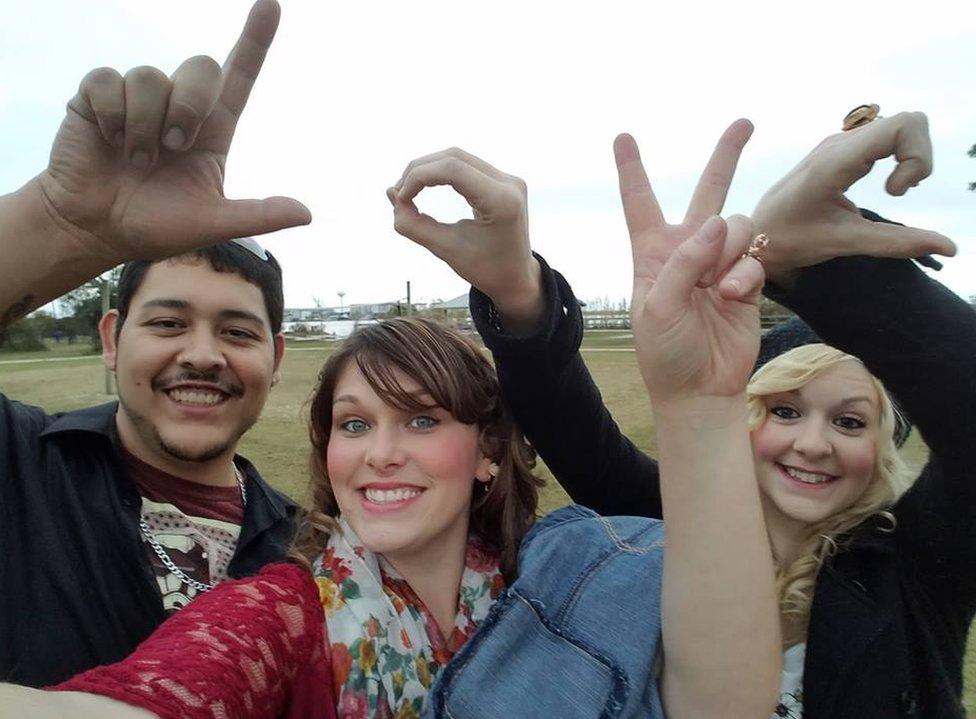
The family find it helpful to have three incomes but the best thing is the "amount of love in our home", Manny says
Manny, 30, says some people are upset by the relationship - a previous employer even threatened to sack him as a result - but others are intrigued.
"Most people immediately think of polygamy and Mormons when they first hear about it and they don't like the idea of a guy with two wives, who don't interact."
"When I say it was more my wife's idea than mine, then people get more understanding."
The trio admit they have all struggled with jealousy but they have learned to be more open with each other.
They are now planning a wedding ceremony for June 2020.
"I'd like something beautiful and casual," says shop worker Melissa. "With a trellis covered in flowers and a rainbow colour theme."
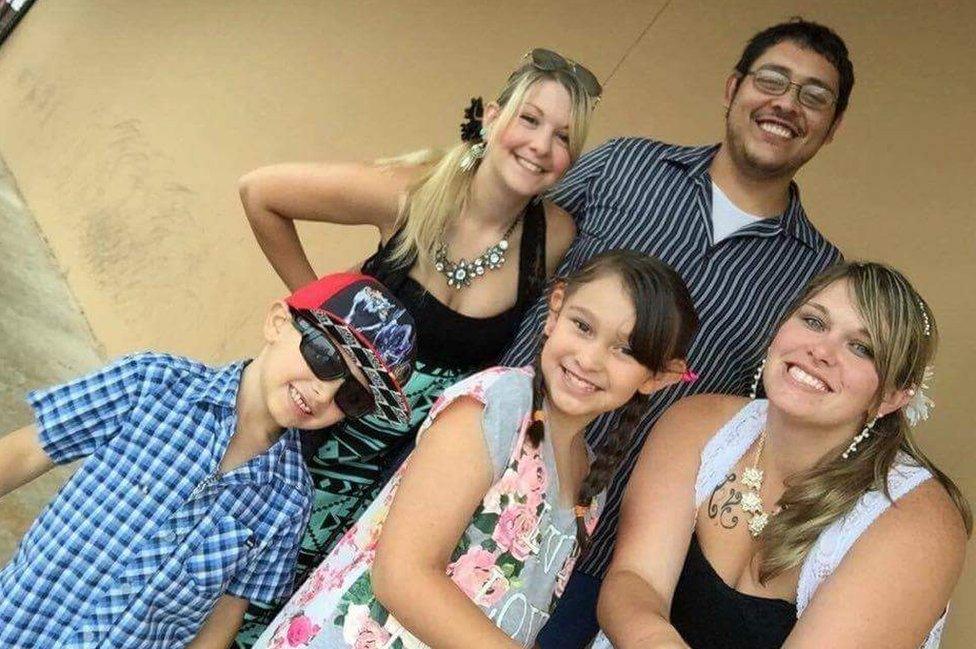
Vaneza and Gabriel "love having two moms", according to DeAnna
They have even picked out a tuxedo for Manny to wear to the ceremony.
But the marriage will not be legal. They must find alternative ways to have their family recognised.
Manny and DeAnna are giving Melissa guardianship of their two children, who already call her "Mamma MJ". Melissa is also planning to change her name to Rivas.
Without marriage rights, though, people even in the most committed polyamorous relationships do not have access to the same legal and tax benefits as married couples.
'There's nothing wrong with it'
The idea has provoked backlash, including in deeply Catholic Colombia where there are calls for the Medellin lawyer to be investigated.
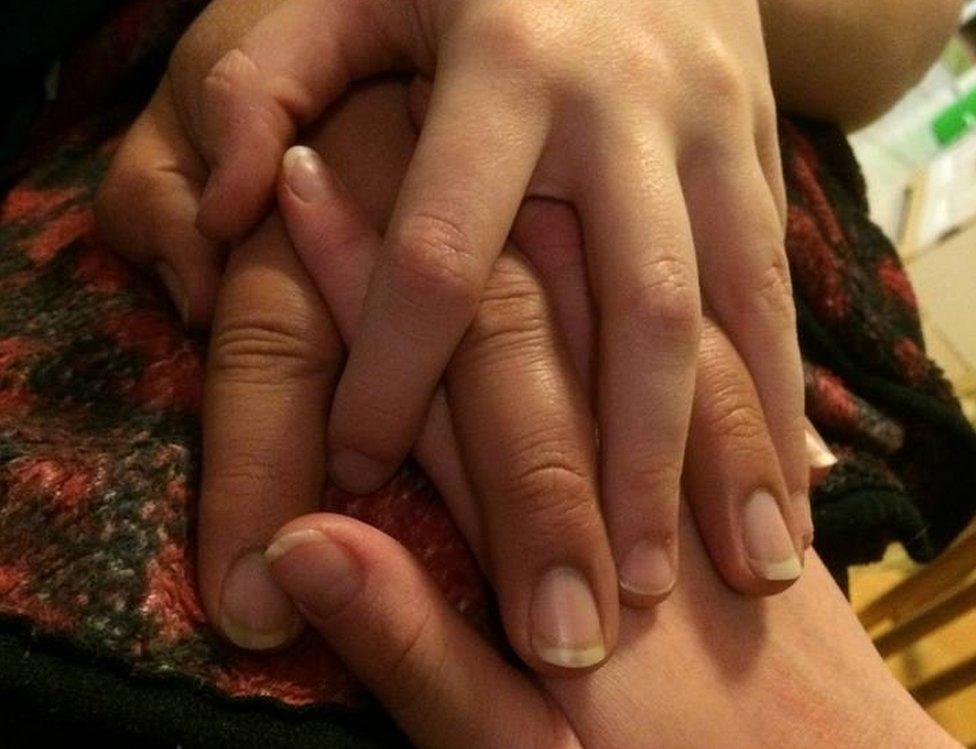
The trio say communication is the most important thing for maintaining a happy three-way relationship
There are fears it could threaten the sanctity of marriage or encourage family break-up.
Some gay rights advocates also oppose it, saying it makes a mockery of their fight for equality and undermines past assurances that same-sex marriage would not be a "slippery slope".
Many people in polyamorous relationships are also sceptical themselves; they may have no desire to go public or embrace traditional family models, says Prof Aviram.
"People don't necessarily want to resemble the mainstream," she says.
If things are going to change, there need to be more role models to show people that polyamorous relationships can last long term, she adds.
Manny Rivas says he "would love for us to be able to get legally married and show people there's nothing wrong with it, show people you can make it work.
"We could help other people accomplish their goals, be an inspiration," he adds.
Additional reporting by Natalio Cosoy, BBC Colombia correspondent
- Published21 July 2017
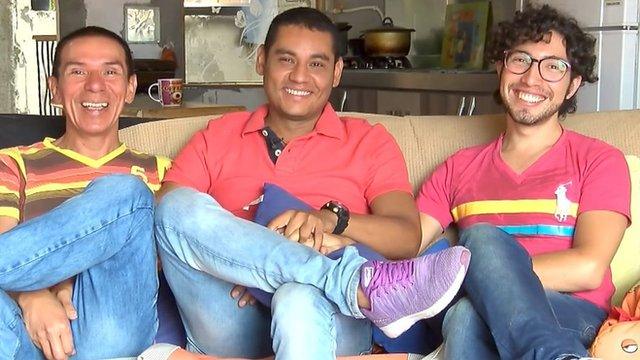
- Published19 August 2013
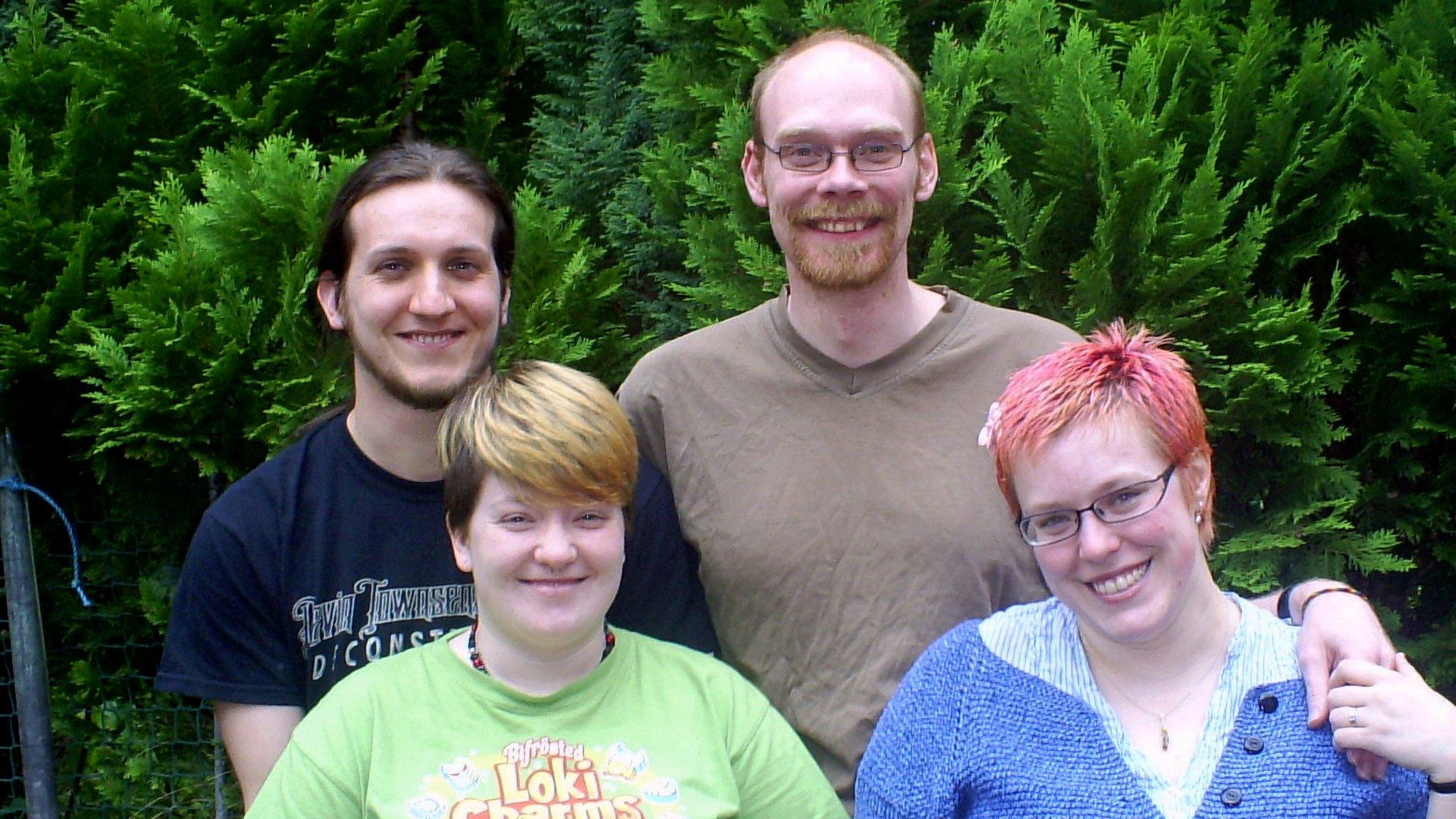
- Published16 February 2017
